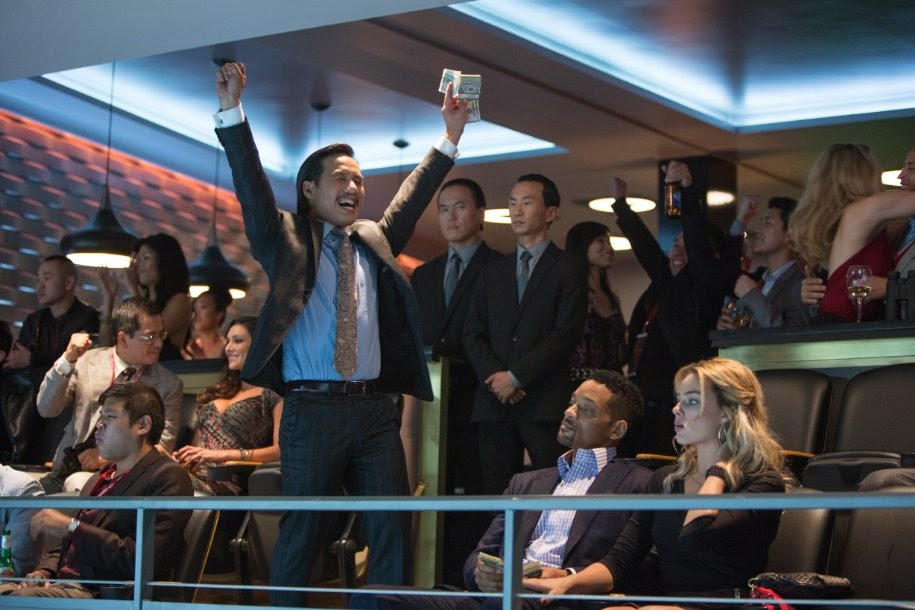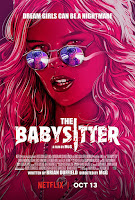Macbeth
Macbeth
(2015)
A Review by Grant Kanigan
Directed by: Justin Kurzel
Written by: Jacob Koskoff, Michael Lesslie &
Todd Louiso, based on William Shakespeare's
play Macbeth
Todd Louiso, based on William Shakespeare's
play Macbeth
Starring: Michael Fassbender, Marion Cotillard,
David Thewlis, Sean Harris &
Jack Reynor
Rating: 14A
Release Date: December 11th, 2015 (Limited)
 |
| Michael Fassbender, awash in the blood of war in Macbeth Image Source |
Macbeth, while still a conventional Shakespearean tragedy is probably the cruelest, most cynical and disturbing of his plays. While the flawed heroes of Othello, King Lear or Hamlet all had tragic faults, they were still fighting vicious antagonists, and had their own motivations for their actions. The only villain the eponymous Macbeth struggles with is himself. Macbeth, at it's core, is an existential struggle between good and evil, tainted by insanity and paranoia. It tells the story of Macbeth, a proud and brilliant warrior who, (at the behest of his wife), decides to murder the King of Scotland and take the throne for himself. However, his guilt and paranoia soon make Macbeth's life a living hell, with the walls of insanity closing in around him. While it makes for brilliant reading, (and fascinating stage productions, if they're done right), it's an odd choice for a film. Most of Macbeth's dialogue is with himself.
Director Justin Kurzel, (who's only previous feature was the little seen but positively reviewed indie The Snowtown Murders), takes on a gargantuan task with Macbeth. With a story soaked in paranoid violence, Kurzel's eye, (by way of cinematographer Adam Arkapaw, the watchful eye behind the viciously Australian Animal Kingdom), is a perfect match for the tough script. With seamless editing, the battle scenes flow flawlessly into one another, making for hypnotic viewing. The opening battle scene filmed in slow motion is a dance of pure bombastic carnage, and a visual feast. Macbeth's hallucinations, too, are filmed in interesting, real-life ways, that suggest a modern interpretation of Shakespeare's play, wherein Macbeth suffers from paranoid schizophrenia, brought on by PTSD.* Finally, the climactic fight between Macbeth and Macduff is surrounded by ash and fire, filmed through a orange filter, suggesting both an internal and external war resulting in the burning of everything that has mattered to both men; a symbolic burning effigy of Macbeth's kingship. The true reason to see Kurzel's Macbeth is the cinematography. Every frame, every second, every moment is absolutely beautiful and artistically inventive. Not since Kubrick has cinematography been so wondrously vibrant.
The other wholly enjoyable aspect of Kurzel's Macbeth is the monumental performances. The insanely talented Michael Fassbender makes for a perfect Macbeth, portraying innocence, anger, confusion, paranoia and ultimately cold-blooded, heartless murder. Marion Cotillard, too, as Lady Macbeth, effortlessly goes from a plotting participant to a guilt-ridden tortured soul. The supporting cast, especially Sean Harris' Macduff, are equally game to tackle the hefty script. Overall, the performances and cinematography make Macbeth an unmissable ticket for Shakespeare and cinema fans alike. However, the film does have some major faults.
Part of Shakespeare's lasting power is that his works are that good. Screenwriters Koskoff, Louiso and Lesslie somehow make the mistake of tinkering with the original play. I'll admit that, yes, extending the opening battle scenes and visualizing introspective parts of Macbeth do work really well in a cinematic atmosphere. However, the screenwriters decide to extend the opening scene into nearly ten minutes, when it's mere pages in the original script. Later too, they decide to cut down most of Lady Macbeth's monologue before her death, simply having her die for no reason. In other moments as well, the filmmakers and script call for visualization instead of the original Shakespearean dialogue, which is arguably the reason to watch the film in the first place. For those unfamiliar with the play, it leaves the viewer lost and annoyed, as if there are chunks of the story accidentally left on the cutting room floor. As well, Macbeth has one of the poorest soundtracks in recent memory. The sound editing is all over the place - in some moments the wind or battle sounds overtake the dialogue, the echoes in a room muddle the sound, or the quiet voices of the actors are inaudible - terrible when Shakespearean dialogue is so important to the story. Honestly, the sound editing and sound mixing are the worst I've seen in years, which is odd considering the visual talent and acting showcased on screen.
Overall, Macbeth is a missed opportunity that features beautiful cinematography and excellent performances; marred by an insistence on changing a near-perfect script for the worse, and atrocious sound-work. I'm excited to see what Kurzel and Arkapaw decide to tackle next, and respect them for taking on Macbeth. It's an adaptation that just misses the mark, but it's still a hell of a lot better than the awful 1971 Polanski film, and it's still an interesting film for Shakespeare fans as well as cinema buffs. All in all, Kurzel's Macbeth is described best by the titular antihero's most famous bit of dialogue; "full of sound and fury, signifying nothing."
GRANT'S RATING: 3/5 STARS
Macbeth clip: "Battle"
*This is purely a modern interpretation. There would have been no way for Shakespeare to have written about PTSD or Schizophrenia, because they didn't "exist," (or more appropriately, hadn't been 'discovered' yet). He could definitely have been writing about similar symptoms, but to place modern terms like PTSD and schizophrenia on a 400 year old text is a slight semantic departure from the original story.



Comments